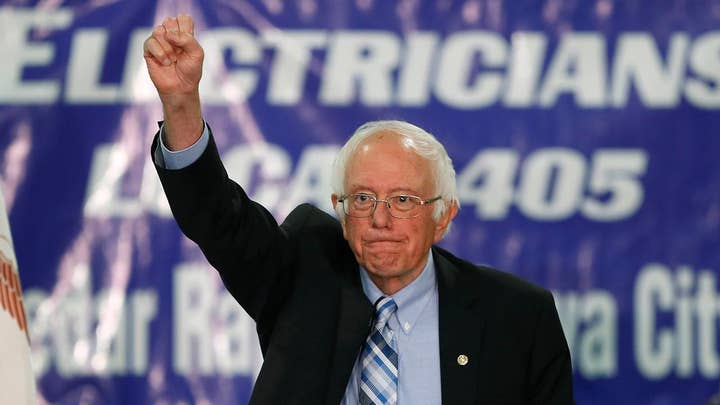Sen. Bernie Sanders, I-Vt., and Rep. Alexandria Ocasio-Cortez, D-N.Y., on Thursday announced a sweeping plan to overhaul public housing as part of their fight against climate change -- a $180 billion agenda that would fund solar panels, energy-efficiency upgrades and “community gardens” for buildings across the country.
"This is a win-win-win piece of legislation," Sanders said outside the Capitol Building.
The plan is the left-wing lawmakers’ latest plank in their broader goal of overhauling the economy with a government-led approach to combat climate change and economic inequality.
AOC PUSHES NATIONAL RENT CONTROL, WELFARE FOR ILLEGAL IMMIGRANTS IN LATEST MASSIVE PROPOSAL
"This is how we show that tackling the climate crisis is an opportunity to create economic stimulus and an economic boon not just for Wall Street but for working people," Ocasio-Cortez said.
The bill will spend up to $180 billion over 10 years to repair and improve public housing, as well as eliminate carbon emissions. The bill would also fund solar panels and other “secure renewable energy sources.” Sanders and Ocasio-Cortez say it would improve living conditions for nearly two million people.
“The Green New Deal for Public Housing would transition the entire public housing stock of the United States, as swiftly and seamlessly as possible, into zero-carbon, highly energy-efficient developments that produce on-site renewable energy, expand workforce capacity and family self-sufficiency programs and focus on community development,” a release from Sanders’ office earlier in the day said.
It comes after the Green New Deal itself, a multi-trillion plan with a significantly broader scope than this legislation, has gone from a far-left, fringe idea to a mainstream idea among some 2020 Democratic presidential candidates -- many of whom have their own version of the plan.
The left-wing lawmakers claim that the plan introduced Thursday will “spur economies of scale for weatherization retrofitting, and renewable energy, making them more cost-effective and attractive throughout the country” and claims it would create a quarter-million union jobs every year and reduce public housing and energy costs.
"This bill will reduce carbon emissions equivalent to taking off the road a million cars, it would reduce public housing costs by 30 percent and energy costs in public housing by 70 percent," Sanders said. "We’re going to save housing authorities money and this [legislation] is going to pay for itself."
The bill outlines how it would create “sustainable communities for families” with a series of grant programs including for childcare, senior centers, clean transit, “healthy food options” and “community gardens.”
Entities seeking to receive grant funding must meet certain requirements, including “Buy America” standards and “high-road labor standards.”
There would be further grants for recycling and zero waste programs and the “expansion of renewable community energy generation.”
Both Sanders, who is running for president, and Ocasio-Cortez, who has endorsed Sanders’ run, have pushed a series of interventionist policies on topics such as climate change, the economy and housing.
The new bill would face a chance of getting through the Democrat-controlled House, but would almost certainly be dead on arrival in the Republican-controlled Senate.
CLICK HERE FOR THE FOX NEWS APP
Ocasio-Cortez last month unveiled a host of bills aimed at tackling perceived economic injustice -- called “The Just Society.” One of those bills, “The Place to Prosper Act,” would impose national rent control by preventing year-over-year rent increases of more than three percent.
Another bill, "The Recognizing Poverty Act," would direct the Department of Health and Human Services to update the federal poverty level by taking into account “geographic cost variation, costs related to health insurance, work expenses for the family, childcare needs, and new necessities, like internet access.” Another bill would urge the U.S. to ratify the United Nations' Covenant on Economic, Social and Cultural Rights.





